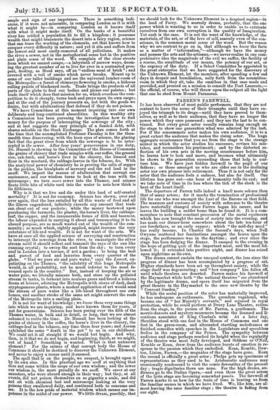FARREN'S FAREWELL.
IT has been observed of most public performers, that they are not content to leave the scene of their triumphs until they have en- joyed the triumph to its dregs—until they have proved to them- selves, as well as to their audience, that they have no longer the power which they once possessed ; and they are the last to be con- vinced. But every great actor usually remains long enough on the stage to show one generation what was admired by the last. For if the consummate actor makes his own audience, it is to a great extent the audience that makes the rising actor. The huge aggregate countenance that you see from the stage is the strange mirror in which the actor studies his successes, revises his mis- takes, and reconsiders his pentimenti ; and by the distorted re- flection of his own acts in the moving countenance before him, he learns how to look and move, and becomes what ultimately, he shows to the generation succeeding those that help to nur- ture him. We have just bidden farewell to the pupil of our fathers ; or those amongst us who are older see in the declining actor our own pioneer into retirement. Thus it is not only for the actor that the audience feels a sadness, but also for itself. One lifetime has gone out—one hour of humanity tolls its end; and we take note of time in its loss where the tick of the clock is the beat of the heart itself.
The departure of Farren tolls indeed a knell more solemn than that of many actors; for it marks the termination of professional life for one who was amongst the Last of the Barons on that field. The manners and customs of society with reference to the theatre have materially changed since Farren began his career, and he leaves the building a sadder home than he found it. It is a com- monplace to note that constant precession of the social equinoxes which has now brought the noon of society into the evening, and has made our dinner-hour somewhere about the late tea-hour of our forefathers, or an early supper; which "the mid-day meal" has really become. In Charles the Second's days, when Nell Gwynne scattered her fascinations amongst the beaux upon the stage, the performance was in the daytime ; and ever since the stage has been dodging the dinner. It escaped to the evening in the hope of getting quit of the important meal, and the meal fol- lowed it; it retreated into positive night, and dinner has seized upon nighttime as its own. The drama cannot sustain the unequal contest, the less since the progress of dinner has been accompanied by a progress of art. Higher standards have been set up throughout society, while the stage itself was degenerating ; and "box company" has fallen off, until whole theatres are deserted. Farren makes his farewell at the Haymarket while both "the national theatres" are abandoned by the legitimate drama, and opera itself has migrated from the great theatre in the Haymarket to the once new theatre by the " Convent Garden."
While the social position of the actor has materially improved, he has undergone an euthanasia. The quondam vagabond, who became one of " her Majesty's servants,' and rejoiced in royal protection, while he could perform at Drury Lane Theatre, retires from the stage, in the person of Mr. Farren, a gentleman. The morris-dancers and mystery-mummers became the licensed and li- centious associates of King Charles's witsi At a later day, Sheridan stood with one foot in the House of Commons and one foot in the green-room, and alternated startling melodramas or finished comedies with speeches in the Legislature and speechless frolics in the company of the Prince. The sympathy between audience and stage perhaps reached its height when the regularity of the theatre was most fully developed, and Siddons or O'Neil, Kemble or Kean, drew from the audience bursts of emotion in re- sponse to the passion which they embodied. Kean, Kemble, Dow- ton, Liston, Farren,—the magnates of the stage have gone. Kean the second is officially a great actor ; Phelps gets up specimens of representations as they used to be. Aristocratic audiences may occasionally condescend to visit the comic favourites of the present day ; tragic dignitaries there are none. For the high drama, an-, diences go to the Italian Opera,—and even there the great actors of the lyric stage are becoming somewhat passes. The farewell of Farren marks to us how far the train of time is bearing us from the familiar scenes in which we have lived. We, like him, are most leaving the once familiar stage ; the theatre is fading from our sight.


























 Previous page
Previous page